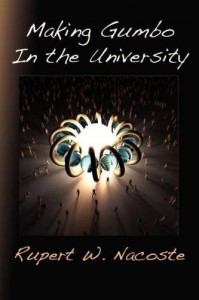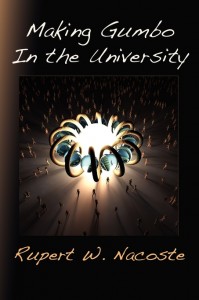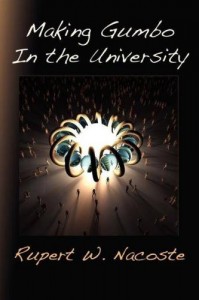Recently, the week of January 22, 2012, on different days, I gave talks to two different student groups. One was a group of students who live in on-campus residences on the Southeast section of our campus. The other was a group of students who participate, off campus, in the Presbyterian Campus Ministry.Â
   For both groups the title of my talk was, “Interpersonal Leadership: Moving from Tolerance to Acceptance.â€Â In both cases, the students admitted that with all the diversity in their social environments there is a lot of worry about being perceived as racist. I told them that such worries come from trying just to be tolerant of people from different groups, rather than trying to accepting that those people are your equals.
   Tolerance, you see, is the shelter for those who are worried, uncertain and anxious. Tolerance is “…putting up with.†You can’t get to acceptance if you are worried, uncertain and anxious. That is why we need “interpersonal leaders.â€Â We need individuals who are willing to stand up to the conformity pressures that push us to just tolerate, and then behind closed doors talk about members of other groups with anti-group slurs and stereotypes. Interpersonal leaders are needed so that we move from tolerance to acceptance; respect for all.
   It was a talk I designed to be a challenge to the students; a challenge to make a difference. It became even more of a challenge when I told them that my time is coming to an end. My time of working to improve the diversity environment of America is almost over.Â
  I started doing diversity work in the U.S. Navy in 1974. I have been at this a long time. That is why I had something to say, and so wrote and published my memoir of work on diversity: Making Gumbo in the University.
   Now it seems that my effort was worthwhile. Reviewing my memoir for the journal Making Connections: Interdisciplinary Approaches to Cultural Diversity Professor Edward Washington wrote:
    “Making Gumbo in the University deserves to be read for its progressive ideas and policies on diversity on the 21st century college campus. Nacoste argues for an intellectually dynamic university and he champions the need for ongoing dialogue about diversity as a way for colleges to remain on the cutting edge of beneficial change. Administrators should not be afraid to lead in this area, all students benefit from learning to be more tolerant of others, and the willingness and ability to change for the better is, for Nacoste, the “responsibility†of all university communities.â€
A reviewer for the Journal of Blacks in Higher Education wrote:
   “Dr. Rupert Nacoste, a Louisiana-born interpersonal social psychologist, draws on the imagery of gumbo to distill lessons learned from his experience as the first vice provost for diversity and African American affairs at North Carolina State University.  (He resigned after two years and returned to the NCSU NCSU North Carolina State University faculty.) Without bitterness, he outlines his view that the recipe for achieving diversity in the modern university requires stirring up the “conflict of ideas” and allowing them to simmer into a rich concoction of durable relationships and intellectual ferment.”
        Finally, Dr. John Saltmarsh, the Director of the New England Resource Center for Higher Education (NERCHE) at the University of Massachusetts, Boston said to his readership: “I highly recommend a very compelling and somewhat iconoclastic book by Rupert Nacoste, the person in charge of diversity at North Carolina State University at the beginning of the 2000s. His book is called Making Gumbo in the University, and is a very smart inside look at the politics and positioning of diversity on campus, and the challenges encountered when taking diversity seriously.â€
  That is why I was serious when I told these NCSU students that my time is coming to an end. But I shocked them when I told them that it is now their time to work for things to change when it comes to acceptance of diversity in America. I shocked them.
   I know that because I saw a reaction in both sets of students’ eyes. In their eyes, I saw thoughtfulness mixed with a bit of fear, and a bit of anger. Me! I have to take this up now. Me! Dammit… why me; why isn’t this done already.Â
  Both sets of students had already admitted to me that they continue to experience “…the moment.â€Â All of them nodded with vigor to say that yes, they had experienced that moment when someone in group utters ugly, intolerant words; racial, gender, ethnic, religious slurs. Oh yeah… they said… and they said that when it happens they are uncomfortable but silent. Yet they looked at me with anxiety, fear and anger when I said their time to work for change had come. Some students actually slide down in their seats.Â
   Arms folded in front of them in self defense in their eyes I saw the question. Why does it fall to “…me†was the question I saw in their eyes. And so I told them why. Because just like they were trying to do, too many before them had been sitting and “…waiting… waiting on the world to change.â€Â No more, I said to them. You asked me to come and speak with you, so now you have no excuse. You cannot say you didn’t know.Â
   You see I taught them a strategy that works. Speak up and speak for yourself. Based on social psychological research (see my previous post), I taught them in that moment all there is something they can do that is easily within their power. That something is to softly say to the person,
- I would prefer not to hear that kind of racial/gender/ethnic slur. I find it offensive.
- I really don’t like to hear people referred to as stereotypes. I find it offensive.
   I showed those students that it is up to them to set new norms for their communities and to talk about new norms and to display new norms. That is how they can become the interpersonal leaders we need in the 21st century America.Â
   So now they had too much information to be able to say “I don’t know what to do.â€Â Now, like the students in my classes, they knew too much. Now like to the students in my classes, I made it clear that they have the ability to work for change and so the responsibility.
   They felt trapped. That is why I saw thoughtfulness mixed with a bit of fear, and a bit of anger. Me! I have to take this up now. Me! Dammit… why me; why isn’t this done already.Â
   Why is it up to them? No heroes will come. Change will come through everyday people standing up for change; being interpersonal leaders. And now is that time. As the prologue to the science-fiction series Torchwood proclaims,
“The 21st Century is when everything changes. You have to be ready.â€





February 2nd, 2012 at 7:11 AM
Remarkable ideas! I have been looking for anything like this for some time these days. Thanks!
February 6th, 2012 at 9:34 PM
I actually learned about a lot of this, but having said that, I still believed it was helpful. Nice post!
February 29th, 2012 at 7:19 AM
Hiya, I’m really glad I have found this info. Nowadays bloggers publish only about gossips and web and this is actually irritating. A good website with exciting content, this is what I need. Thanks for keeping this site, I’ll be visiting it. Do you do newsletters? Can not find it.